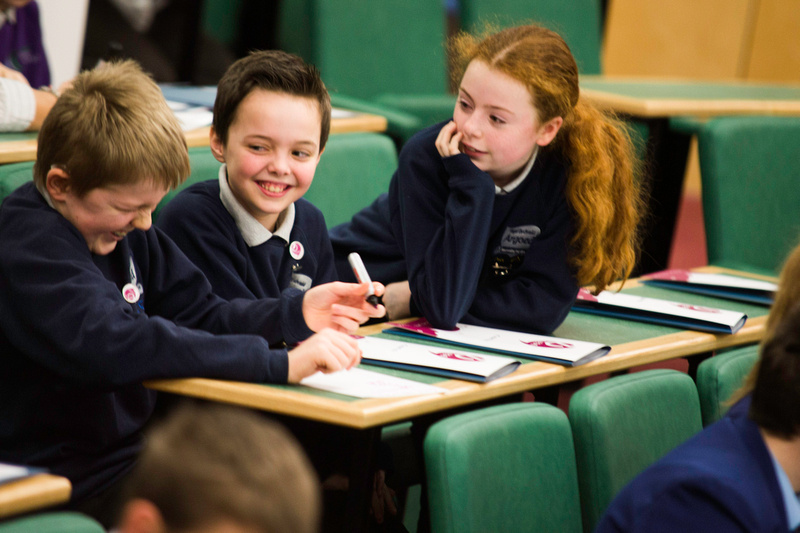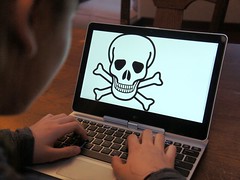
"Until adults move on from the dismissive and patronising position of ‘the online world isn’t real or valid’ we will continue to fail in the quality of the support we offer our children."
Simon Finch suggests a much more useful approach.

"Until adults move on from the dismissive and patronising position of ‘the online world isn’t real or valid’ we will continue to fail in the quality of the support we offer our children."
Simon Finch suggests a much more useful approach.

Being safe on the internet is vital. If you’re concerned about being safe on the internet or just want a few ideas of how to be safe you have come to the right place!
 I came across the eCadets scheme recently, and mentioned it in the special e-safety edition of Digital Education. I thought it sounded very interesting. With schools looking for more sustainable eSafety solutions I caught up with the co-founder of the innovative eCadet scheme, Henry Platten, to find out how to create a lasting eSafety legacy in your school. Ever come across those schools where the e-safety “policy” consists of a Local Authority template with the blanks filled in with the school’s name, and stuck in the bottom of a filing cabinet in the headteacher’s office? Well, the e-Cadets scheme aims to change all that by giving the children themselves responsibility.
I came across the eCadets scheme recently, and mentioned it in the special e-safety edition of Digital Education. I thought it sounded very interesting. With schools looking for more sustainable eSafety solutions I caught up with the co-founder of the innovative eCadet scheme, Henry Platten, to find out how to create a lasting eSafety legacy in your school. Ever come across those schools where the e-safety “policy” consists of a Local Authority template with the blanks filled in with the school’s name, and stuck in the bottom of a filing cabinet in the headteacher’s office? Well, the e-Cadets scheme aims to change all that by giving the children themselves responsibility. This is a bumper edition that contains loads of articles, including contributions from Rose Luckin, Maddi Holt, student Ellie Gregson, student Caleb, pupil Anna, Alan Mackenzie and Simon Finch. Read on for the full list of contents.
This is a bumper edition that contains loads of articles, including contributions from Rose Luckin, Maddi Holt, student Ellie Gregson, student Caleb, pupil Anna, Alan Mackenzie and Simon Finch. Read on for the full list of contents. I thought you might like some information on the forthcoming edition of Digital Education, which includes a special e-safety supplement. It contains the following articles:
I thought you might like some information on the forthcoming edition of Digital Education, which includes a special e-safety supplement. It contains the following articles: I had the pleasure of attending one of the RM Technical seminars recently, and it was well worth the time. The event was divided into several strands. I chose the Curriculum and E-safety option rather than one of the more technical ones.
I had the pleasure of attending one of the RM Technical seminars recently, and it was well worth the time. The event was divided into several strands. I chose the Curriculum and E-safety option rather than one of the more technical ones.
As well as a very entertaining keynote lecture by Sir Ranulph Fiennes, there were three sessions:
Updated! Discounts, competitions, news of events coming up, commentary, and advice about internet safety! And it's completely free!
Here’s what this issue contains:
 I talked to members of the Lewisham Youth Parliament about sexting and they talked to me about the selfie, they described a selfie as a demonstration of confidence and self-esteem: ‘I look good and in sharing this you will know I look good too’.
I talked to members of the Lewisham Youth Parliament about sexting and they talked to me about the selfie, they described a selfie as a demonstration of confidence and self-esteem: ‘I look good and in sharing this you will know I look good too’. There must be a whole generation of people who know the mechanics of using technology, but have no idea of how to take charge of it. I am thinking in particular of the ridiculous marketing messages I receive, that advertise targeted marketing services. I mention this because, despite all the lambasting of “Office skills”, it is demonstrably clear that people need them. I could even make a case for this being related to digital safety. How? Reputation is important, and marketing messages that have “schoolboy errors” do nothing to enhance one’s credibility. Consider the following examples:
There must be a whole generation of people who know the mechanics of using technology, but have no idea of how to take charge of it. I am thinking in particular of the ridiculous marketing messages I receive, that advertise targeted marketing services. I mention this because, despite all the lambasting of “Office skills”, it is demonstrably clear that people need them. I could even make a case for this being related to digital safety. How? Reputation is important, and marketing messages that have “schoolboy errors” do nothing to enhance one’s credibility. Consider the following examples: Should schools have Acceptable Use Policies? The following article was originally published in April 2008. Apart from the references to the ‘recent’ Byron Review and to Becta, it still seems very apposite to me. If I were writing the article today, I’d bring in Responsible Use Policies, but otherwise I believe it still stands. What do you think?
Should schools have Acceptable Use Policies? The following article was originally published in April 2008. Apart from the references to the ‘recent’ Byron Review and to Becta, it still seems very apposite to me. If I were writing the article today, I’d bring in Responsible Use Policies, but otherwise I believe it still stands. What do you think?
One of the things recommended by the recent Byron Review into keeping children safe in a digital world was for schools to have acceptable use policies
 E-safety guru Simon Finch talks about why pupils should be allowed to use social media, why teachers should use it, e-safety and identity management.
E-safety guru Simon Finch talks about why pupils should be allowed to use social media, why teachers should use it, e-safety and identity management.The time: Now
Teacher: So, class, that’s your homework for today.
Boy at the back: You can’t do that, Sir. I know my rights.
T: Er, sorry, I can’t do what exactly?
BATB: Set us that homework, Sir.
T: Why not?
BATB: ‘Cos it will take about half an hour, Sir, and you’re only allowed to give us 20 minutes. I know my rights.
T: OK, do 20 minutes this evening, and 10 minutes tomorrow evening.
BATB: You can’t tell me that, Sir.
T: OK, and why not?
BATB: Cos I have a right to a private life under Article 8 of the European Convention of Human Rights, Sir. I know my rights.
Lights dim as the characters continue arguing. Exeunt.
 Her Majesty The Queen of England serves as an inspirational role model in terms of personal privacy. Despite being in the public eye for 60 years, she has managed to keep her personal opinions to herself. Almost nobody knows, for example, what her favourite tea is (although Smokey Earl Grey has been hinted at). Yet there are many people who seem to announce to the world each time they blow their nose!
Her Majesty The Queen of England serves as an inspirational role model in terms of personal privacy. Despite being in the public eye for 60 years, she has managed to keep her personal opinions to herself. Almost nobody knows, for example, what her favourite tea is (although Smokey Earl Grey has been hinted at). Yet there are many people who seem to announce to the world each time they blow their nose!
The balance between public and private is, of course, a personal choice, and one made more difficult by other people openly talking about one’s activities or tagging one’s photos, and much standard business advice. But if you do want to be fairly private while maintaining a strong online presence, here are some suggestions. You may like to share and discuss these with students, who are also striving to get this balance correct.
 Concentrating purely on web filtering to keep kids safe online is a bit like looking for your keys under a lamp post because, although you lost them somewhere else, it’s lighter there. A third of children in Europe access the internet from a mobile device, according a new report:
Concentrating purely on web filtering to keep kids safe online is a bit like looking for your keys under a lamp post because, although you lost them somewhere else, it’s lighter there. A third of children in Europe access the internet from a mobile device, according a new report:
33 % of 9 to 16 year-olds who go online say they do so using a mobile phone or other handheld device.
 What’s happening in the world of e-safety, especially in the UK? Here are some interesting items from the November 2010 issue of Computers in Classrooms, the free e-newsletter for those with a professional interest in educational ICT. The items include:
What’s happening in the world of e-safety, especially in the UK? Here are some interesting items from the November 2010 issue of Computers in Classrooms, the free e-newsletter for those with a professional interest in educational ICT. The items include:
 Childnet International, a registered charity whose mission is to work in partnership with others around the world to “help make the Internet a great and safe place for children”, is running a film competition. Here are the details:
Childnet International, a registered charity whose mission is to work in partnership with others around the world to “help make the Internet a great and safe place for children”, is running a film competition. Here are the details:
Just a quick reminder: this annual event us nearly upon us – tomorrow, 8th February 2011. See the Safer Internet Day website, and the Safer Internet Day Fair. What will your school be doing for the event? Check out the Think u Know website too. You might also find this post interesting: Digital Safety for Children and Youth. It has some interesting links.
First published in Computers in Classrooms, the free e-newsletter for edcational ICT professionals.
(c) Terry Freedman All Rights Reserved